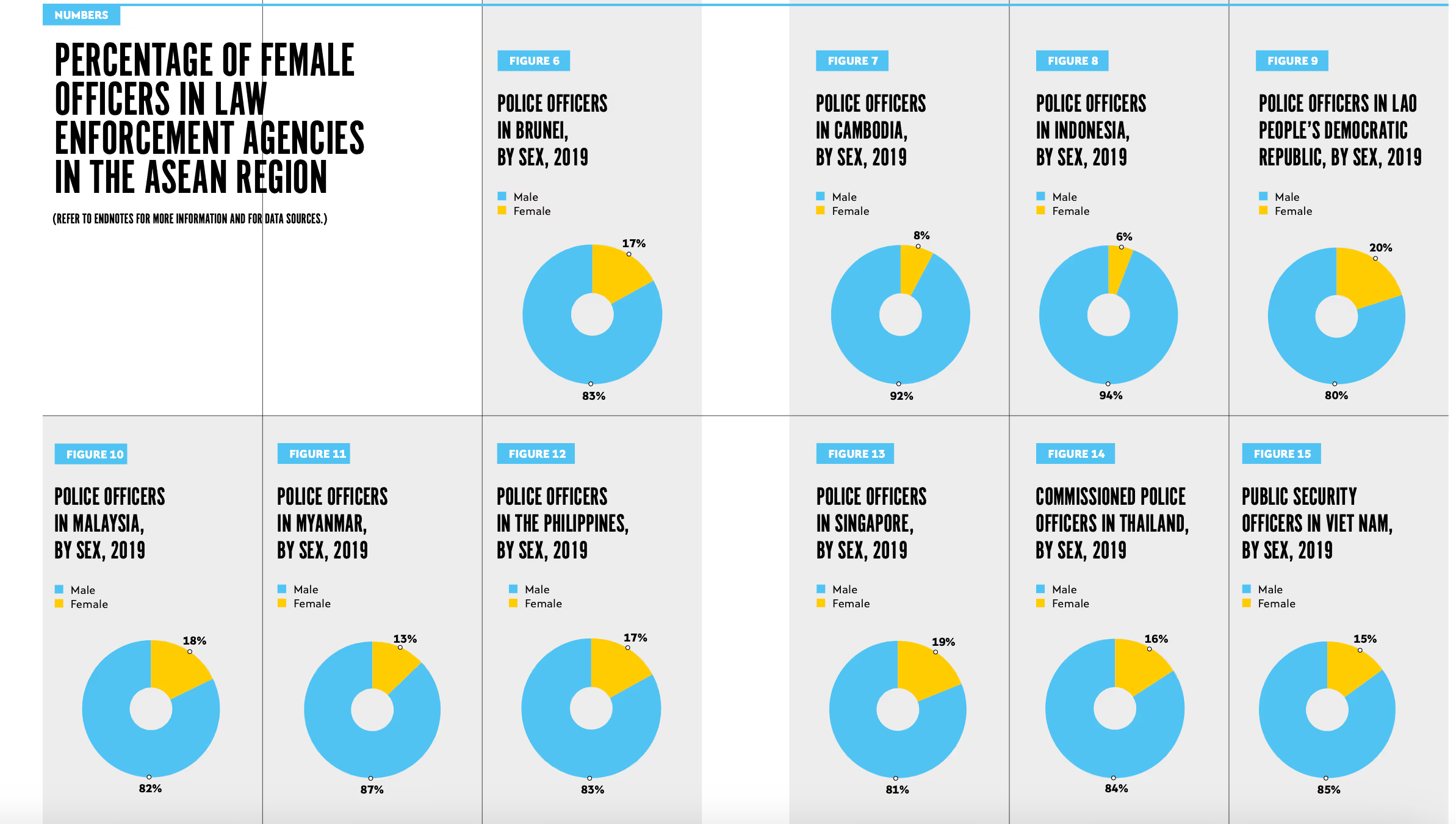Promoting Women in Law Enforcement in the Asia-Pacific

November 13, 2023
Last month Suchaya Mokkhasen, Border Management Programme Officer for the United Nations Office on Drugs and Crime, spoke at the Security Women conference in London on October 18, drawing attention to the 2019 Promoting Women in Law Enforcement in the Asia-Pacific Report.
The report identifies women's limited access to continuous training throughout their careers as a major barrier to their meaningful participation in law enforcement. For instance, in Brunei, women are not permitted to travel alone, and unrelated men and women are not permitted to travel together, making it difficult to attend training exercises.
Alternatively, women are often excluded from specialised training programmes due to their bearing the primary responsibility for care work in the home, making it difficult for them to travel far and/or for long periods of time.
Women officers in the Phillipines also highlighted the lack of mental health support, especially when handling cases of violence against women.
Other countries impose additional restrictions on female applicants, for example virginity testing or marriage requirements (being unmarried at the time of applying, during the study period or after graduation).
In Thailand, blockers to women's participation are even more overt. While women were first allowed to enrol at the Royal Police Cadet Academy in 2009, they were barred in 2019 from enrolling in the two-year Pre-Cadet Academy necessary to be accepted into the four-year Bachelor's degree at the Royal Police Cadet Academy.
Similarly, Vietnam has a maximum 10% quota for women in professional police, and a 15% maximum for women in political branches, engineering, logistics, and foreign languages.
Women officers in the region also reported that quotas intended to increase their representation functioned, in reality, as a ceiling for regulating women's access to the profession. For instance, in Thailand, there are typically 120 female applicants for each cadet position, while there are only 70 male applicants for each identical position. Successful female candidates are therefore highly qualified and among the best academic performers.
To see the full report, see here

November 13, 2023
Promoting Women in Law Enforcement in the Asia-Pacific

November 13, 2023
Last month Suchaya Mokkhasen, Border Management Programme Officer for the United Nations Office on Drugs and Crime, spoke at the Security Women conference in London on October 18, drawing attention to the 2019 Promoting Women in Law Enforcement in the Asia-Pacific Report.
The report identifies women's limited access to continuous training throughout their careers as a major barrier to their meaningful participation in law enforcement. For instance, in Brunei, women are not permitted to travel alone, and unrelated men and women are not permitted to travel together, making it difficult to attend training exercises.
Alternatively, women are often excluded from specialised training programmes due to their bearing the primary responsibility for care work in the home, making it difficult for them to travel far and/or for long periods of time.
Women officers in the Phillipines also highlighted the lack of mental health support, especially when handling cases of violence against women.
Other countries impose additional restrictions on female applicants, for example virginity testing or marriage requirements (being unmarried at the time of applying, during the study period or after graduation).
In Thailand, blockers to women's participation are even more overt. While women were first allowed to enrol at the Royal Police Cadet Academy in 2009, they were barred in 2019 from enrolling in the two-year Pre-Cadet Academy necessary to be accepted into the four-year Bachelor's degree at the Royal Police Cadet Academy.
Similarly, Vietnam has a maximum 10% quota for women in professional police, and a 15% maximum for women in political branches, engineering, logistics, and foreign languages.
Women officers in the region also reported that quotas intended to increase their representation functioned, in reality, as a ceiling for regulating women's access to the profession. For instance, in Thailand, there are typically 120 female applicants for each cadet position, while there are only 70 male applicants for each identical position. Successful female candidates are therefore highly qualified and among the best academic performers.
To see the full report, see here




